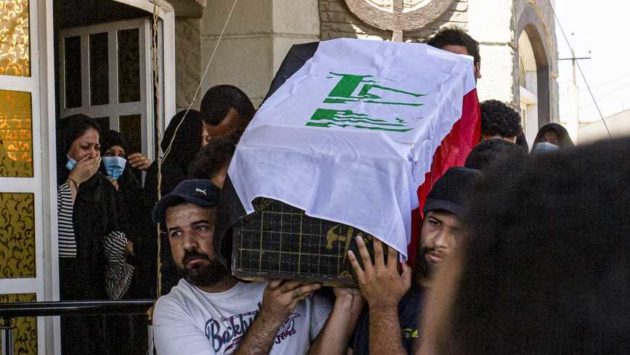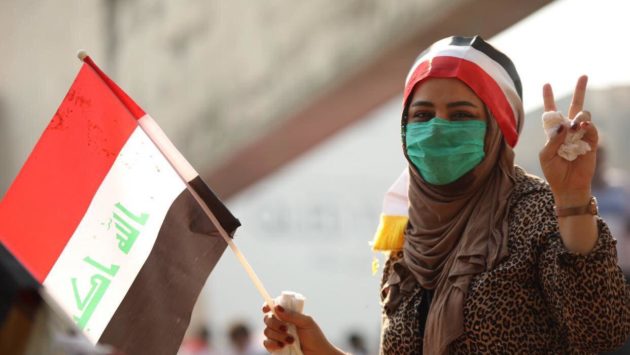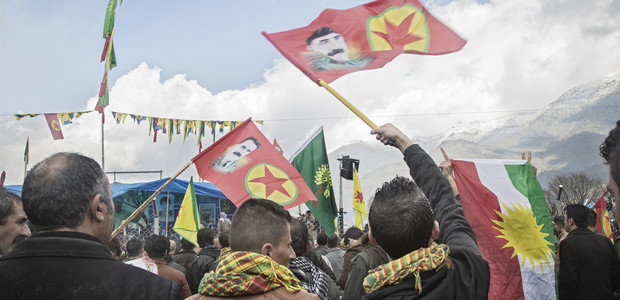Iraqi Demonstrators Call to Keep Iraq Away from the American-Iranian Conflict
Aktham Saif Aldeen – Al-Arabi Al-Jadeed
On Saturday 4 January, the public squares in Baghdad and in the southern governorates witnessed new momentum, reinforcing the enduring strength of the nonviolent demonstrations throughout the country which are now entering their fourth month: hundreds more protestors have now joined in, coming out to these public spaces to make their voices heard. The protesters insist that Iraq should stay far away from the American-Iranian conflict, and they have called for the President of the Republic to choose decisively and immediately an independent prime minister for the Iraqi government.
Hundreds of protesters arrived in al-Tahrir Square on Saturday morning, despite the tight security measures that accompanied the funeral of the Iranian “Quds Force commander” Qassem Soleimani, and the deputy leader of the “Popular Mobilization” militias, Abu Mahdi Al-Muhandis. The demonstrators raised banners affirming their refusal to turn Iraq into a battlefield or the site for a proxy war between Washington and Tehran.
Activists confirmed that the locations which have been the sites of ongoing peaceful demonstrations in Iraq began this weekend to fill with even larger numbers of nonviolent demonstrators, chanting slogans calling for Iraq to stay out of the conflict in the region, especially the Iran-US conflict.
Civil activist Bilal Al-Amiri told Al-Arabi Al-Jadeed, “Today, the demonstration arenas have witnessed a large influx of protesters … Our demands in all Iraqi governorates are unified around a single call to keep the country out of the conflict in the region,” noting that Iraq and its best interests are getting lost in the struggles among regional and international powers, that is, in those external political forces which have dominated and ravaged the country since 2003.
“We want our Iraq to be for Iraqis, and we demand an independent government, with an independent presidency that works for Iraq only, not for the benefit of Iran or others.”
Bilal Al-Amiri called on the President of the Republic, Barham Salih, insisting that “the issue of choosing an independent head of government must be decided, and the decision must not be subject to partisan and Iranian pressure.”
The demands raised in Tahrir Square matched those in the southern governorates where sit-ins continue on a daily basis: peaceful protestors in public squares in the governorates of Karbala, Dhi Qar, Qadisiyah, Muthanna, Basra, and Najaf have seen massive demonstrations today, amid cheers and slogans denouncing the power partisan politics, and denouncing external interference of all kinds.
Even given tight security measures in most southern governorates, many local civil society organizations participated in the nonviolent demonstrations, giving their full support to the legitimate demands of the demonstrators, reiterating that the voice of the demonstrators will continue to be heard until their demands are met.
Nonviolent demonstrators continue to gather throughout Iraq amidst the ongoing political dispute, pushing back against the Iranian-backed Bina’a alliance which is holding out for the position of prime minister and exerting continued pressure on the President of the Republic to accept its candidates.
Politicians expect that Abdel-Mahdi will continue to act as head of the caretaker government for the immediate future. A member of the State of Law bloc and the former deputy, Jassim Mohammad Jaafar, said that “Abdul-Mahdi and his government will remain for another three months.” He went on to stress in a statement to the press that “the current political situation and the recent American aggression have confused all cards on the table in the country and undermined the attempt to resolve the formation of a new government in Iraq…The political blocs,” he said, “are currently too busy stabilizing their positions after the blatant American aggression, and they are not thinking now about the urgent issue of forming the government.”




